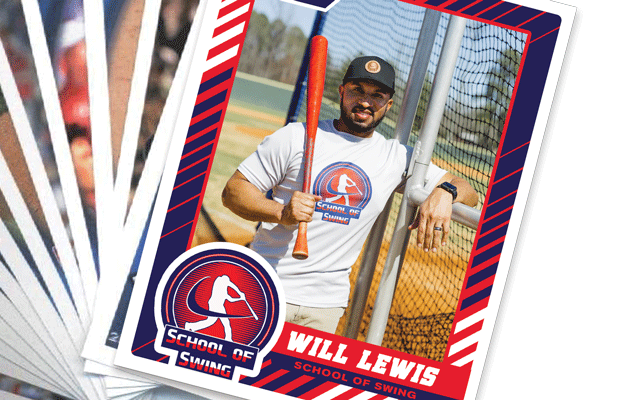School of Swing

For baseball and softball players, especially talented hitters, balance is the key. It allows them to maintain a strong foundation and react to pitches they hit versus those they choose to let go. Simply put (and something anyone who’s ever picked up a bat has heard), balance allows a hitter to track the ball and swing with strength and confidence.
Balance is also an important piece of Will Lewis’ life and was a major reason he started his mobile hitting clinic, School of Swing, almost two years ago.
“I was co-owner at another baseball facility and was always there working with other kids, never really seeing my own,” he said. “After a full day, I would get home and miss putting my son and daughter to bed or miss having dinner with my wife and kids. I loved what I was doing but could really feel the affects it was having on me and my family as well.”
After COVID-19 forced the temporary closure of nonessential businesses, including the facility where Lewis worked, he made a career change into the medical field that proved to be one of the best decisions of his life. “I was able to enjoy being home with my family in the evenings and gained some real perspective on what I was doing.”
A lifelong baseball player from Texarkana, Lewis had always been involved with the game. A 2003 draft pick to the Milwaukee Brewers out of Texas Christian University (TCU), he played five years in the minor and independent leagues before retiring in 2008 (Writer’s note: Lewis’ last professional hit came in the Pensacola Independent League (American Association League) off Pat Mahomes, Sr., father of Kansas City Chiefs quarterback and NFL MVP, Patrick Mahomes).
“I’d learned so much from the game and wanted an opportunity to share those lessons with young players who were eager to learn and get better,” he said. “In some cases, I wanted to coach players on the proper way to approach hitting, but also on some things they need to avoid because there are always bad habits waiting to creep into a player’s swing. The best part about baseball is how it prepares you for the game of life.”
After Lewis retired from baseball, he and his young family relocated to Central Arkansas where he began training hitters. Though COVID-19 allowed him to change his focus and regain some much-needed professional and personal balance, it wouldn’t be long until he again found himself in an all-too-familiar place.
“Even though I’d found another career during the lockdown from the pandemic, I kept going up to Tyndall Park to work with my son and a couple other clients,” he said. “Word spread, and some parents asked if I had any more availablity, in case the season resumed in the summer.”
And just like that, Will Lewis was training hitters again through his new business, The School of Swing.
“The name was fun and came from a hitting class I’d developed for a previous clinic,” he said. “What started out as one or two hours grew into five hours a day, four days a week at the ballpark. I was able to continue working with baseball, which is what I loved, while being able to better manage my home life.”
What’s more, because Lewis isn’t obligated to one specific baseball and softball facility, he’s able to work with a variety of players of all levels and has the flexibility to take his training methods on the road, helping young players across the South.
“It was important for me to be my own entity and have the freedom to work with any of the kids who wanted to work with me. I know sometimes sports academies and training centers can get a bit territorial, and that was the main thing I wanted to avoid.
“I have some contacts in Alexandria, Louisiana,” he added. “When they heard that School of Swing was mobile, they invited me to use their space to come down and work with players there. I’m really happy doing my own thing and having the freedom to go where the players are.”
So what is Lewis’ philosophy that has put his training in such demand?
“It’s pretty simple—just be yourself,” he said. “Growing up as a player, one of the problems I found was hitting coaches always taught me to hit like them, like they thought I should perform. Watching players in the big leagues, everyone has different pieces within their style. They have different body types, different strengths, and different approaches.
“It’s true that a hitter has to maintain certain mechanics and fundamentals. But there’s also a lot in between, and that’s what I try to teach my hitters. In the end, we’re going to learn the fundamentals, but I don’t need them to hit like me. I need them to hit how God designed them to do it. I simply teach athletes how to use their body correctly to hit the ball hard. The more a hitter makes solid contact, the better chances they get a hit.”
Lewis admits his approach is a departure from the data-driven, analytical breakdown players are subjected to today. His belief is that there’s a place for both, and young hitters shouldn’t get buried in the new “science of baseball.”
“Coaches and scouts consider things like exit velocity when watching hitters perform. How fast does the ball come off the bat, and at what angle? While that information is valuable in training, I don’t think it should be the only way to analyze a hitter’s performance and determine what we might consider ‘good.’”
Through the School of Swing, Lewis works with baseball and softball players. He offers in-person and virtual swing analysis through remote training. To learn more and to schedule sessions, go to www.schoolofswing.square.site or email schoolofswingAR@gmail.com.










0 comments